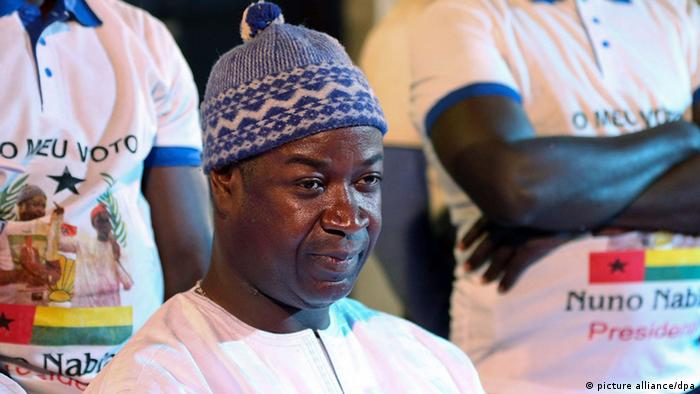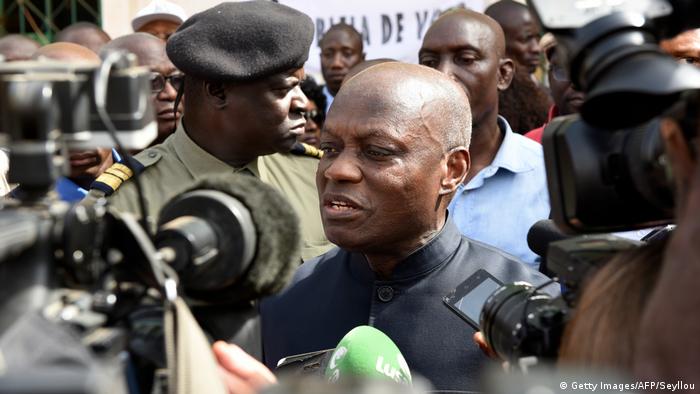In the case of parliamentary elections in Guinea-Bissau, the ruling party, the PAIGC gained the most seats but fell short of an absolute majority. The hopes for a new beginning in political terms still remain low.

After the results announcement in Bissau, the mood in the government was subdued party: “we are sorry that the election result has not met our expectations,” said Domingos Simões Pereira, Chairman of the “African party for the independence of Guinea and Cape Verde” (PAIGC). The party received in the parliamentary elections of Sunday consent for 47 members, and was thus close to an absolute majority in the country, which has been stuck for years in the political stalemate.
Small parties give the rash
Already before the official announcement by the election Commission on Wednesday, the most powerful party in the country had announced their election victory. More than twenty parties participated to the choice of the 102 deputies in the Parliament. In the end there were three parties that fought the battle under: The PRS (party of social renewal) with 27 members the second largest group, followed by the new political Formation “Madem G15” (movement for a democratic Alternative), with 21 deputies. Both had short-circuited before the result announcement of an Alliance.

From presidential candidates to the king-maker: Nuno Gomes Nabiam
The PAIGC had, in turn, formed yesterday a coalition with smaller parties, in order to be capable of governing. The new Parliament will choose a Prime Minister. While Nuno Gomes Nabiam of the small party of APU-PDGB be given to the role of king-maker. He had signed on Tuesday an agreement with the government party to a majority in the Parliament. Gomes Nabiam was defeated by President Vaz in the second round of the presidential elections in 2014 politically. If the Alliance exists, it would be Pereira’s warehouse with 54 Seats, the government is capable of.
Breathe a sigh of relief after the election
The elections on Sunday were quiet and without incidents in the country, whose policy in the past years by coups and Coup attempts was determined. About 750,000 voters in the Two-million inhabitants of the state were called to determine the members of Parliament. Many women and young people had queued in long queues on Sunday to wait in front of the polling stations. At the end of the day, President José Mario Vaz accounted for a ballot, “without the Deaths, without fights, without arbitrary arrests.”
Read also: Nigeria in Chaos after Governor elections
The inhabitants of the small West African country had great hopes for a political new beginning: “We need change in this country,” said Nene Niyè in the DW-Interview. “Our children do not go to school. I will do everything in our household, because my husband goes to work. But he’s not been paid for months.” How many in the country, the family suffers from a political power struggle, since more than three years, the country virtually to a standstill: The Parliament and the President are blocking each other.

The hope for a new beginning motivated the voters
Power crisis paralyzes the country
Many people in Guinea-Bissau, hope for stability and economic growth. The small West African country would have both sorely needed: After the military coup in 2012, a political and economic period ruled crisis. On the human development Index of the United Nation of Guinea occupied-Bissau, only 178 of 188 countries.
The current power crisis runs through the heart of the former independence movement PAIGC, the defeated in 1974, the Portuguese colonial regime. The three main adversaries in the political crisis are enjoyed by all the party. The conflict began when President José Mário Vaz (PAIGC) enjoyed his own party and intimate enemy of Domingos Simões Pereira withdrew from the office of the government. After Vaz began a Deputy of the opposition party PRS as head of government, the Situation escalated. The President of the Parliament, Cipriano Kassamá (PAIGC), refused any cooperation with the President and his newly-appointed head of government.
Clientelism, interests, and the glory of bygone days
Since then, nothing moved in the Parliament. And the characters are not yet of an improvement. “There is nothing to suggest that the elections will provide a way out for the country’s problems,” said UN Secretary-General, António Guterres, before the vote. He urged it to clarify the distribution of tasks between the President and the Prime Minister.
Also read: Togo: parliamentary elections without Opposition

Happy about the peaceful Election process: President Jose Mario Vaz on Sunday
“It is not just a single party that is in crisis,” says Rui Landim, a former employee of the University of Guinea Interview Bissau in the DW. “It is the complete System, the institutions. The System consists of people, who pursue their own interests and those of your customers and the clan.” There were no differences between the political parties, their programmes and strategies, said Landim. “Only when the personal interests of anyone are not respected, then what is going on in the government party.”
With the greatest financial resources, is a relatively professional organization, and lives the more of the glory of bygone days, to be once a successful liberation movement against colonialism.
Read also: Colonial heritage: Germany should return the cultural property
But the political standstill of a non-viable government has left its mark in the poor country. Many schools and universities are closed for years, the justice system works, the public health system is on the ground. The state of the money for the most basic tasks. Guinea-Bissau is one of the poorest countries in the world. Even the elections this Sunday had to be financed by international supporters.
Employees: Braima Darame, Bram Postumus

